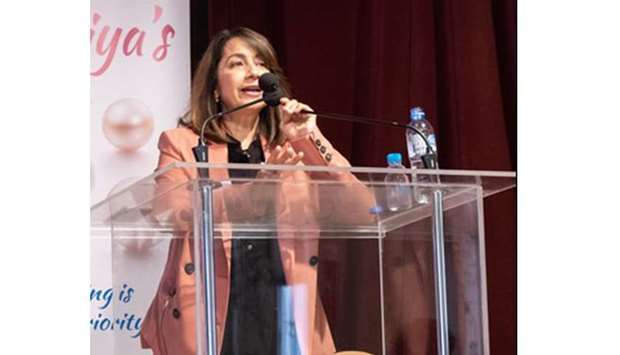Dr Atiya Bashir, one of the renowned paediatricians in Doha, recently held an awareness event at Pakistan International School Qatar. The event aimed to give back to the community especially to the children belonging to low-income families. Despite of the fact that everyone in Doha have access to primary healthcare, a lot of parents don’t have the knowledge or the awareness of how harmful the processed meats or sugar or even screen addiction are for their kids. Dr. Atiya’s Pearls is reaching out to those parts of the community and educating them about what is good for the children and their well-being.
The two-hour programme kicked off with Dr Atiya highlighting about good and bad eating habits, hygiene, healthy lifestyle, screen time addiction and the need for being active in order to avoid conditions like obesity, Type 2 diabetes, high blood pressure and other behavioural issues. She explained how she sees patients as young as 9 months old who are addicted to screens and have severe behavioural issues at such a young age. She also spoke about a recent study that has shown how excessive screen time is now linked to brain changes as revealed by MRI scans and how the kids’ literacy language and social skills suffer with excessive screen use.
The event also featured a presentation on transport and road Safety by Dr Talat Chughtai, Trauma Surgeon. Dr Talat spoke about road and car safety. He also explained about life altering impact of accident cases he sees in the hospital on daily basis and how most of them could have been avoided if the person had taken the road and car safety measures. The presentation was followed by students going through live stations and display of good and bad food and clothing items.
Speaking to Community on why she started this programme and what she wanted to achieve from it, Dr Atiya said, “I desperately felt the need to address larger audience than only the ones who have seen my practice. I felt that kids who cannot visit a private practice due to the lack of resources also deserve equally good health care advice. Our programme, Dr. Atiya’s Pearls, provides age appropriate anticipatory guidance that prevents development of conditions like obesity, type 2 diabetes, high blood pressure and behavioural issues. It addresses their nutrition, hygiene, daily physical activities, sleep and time spent on digital gadgets. It helps in diagnosing and promptly treating illnesses that may be physical, psychological or behavioural. The programme helps families raise healthy, happy, well-rounded children who can grow up to their full potential, into healthy and useful members of society as adults. Our goal is to reach out to as many schools as possible and address issues that may be unique to the population they are serving”.
Dr Atiya believes that speaking in front of parents, teachers and students put everyone on the same page, which is a big advantage of an event like this. So far, they have executed 4 programmes successfully at different private schools in Doha and the Al Khor community.
The team members of Dr. Atiya’s Pearls are all volunteers who spend their time and put all this effort in trying to make a difference in the life of these families. The team members come from diverse backgrounds and each one of them support the programme in their own unique way. The volunteer team, includes Rabia Khanzada, Project Co-ordinator; Sara Rizvi and Maheen, Activity Co-Ordinators and Supply In Charge; Sohaim and Amir , IT setup and support; Dr Ujala, Reshma, Rubina and Saman, demonstrators of live stations and judges of poster competition; and Rana Smith, branding and advertisement.
Dr. Atiya’s Pearls is a community initiative that is trying to work at the grass root level and reaching out to the community to provide the knowledge to the members of the community who might not have access to the best quality healthcare.
‘Health Care and Education is a human right, not a privilege’, and Dr. Atiya’s Pearls is taking a step forward and not only are they reaching out to the community to provide health care who can’t afford it but to also prevent the possible health care issues that can harm the future of the kids.

AWARENESS: Dr Atiya highlighted about good and bad eating habits, hygiene, healthy lifestyle, screen time addiction and the need for being active in order to avoid various health conditions. Photos by Shehar Bano Rizvi
